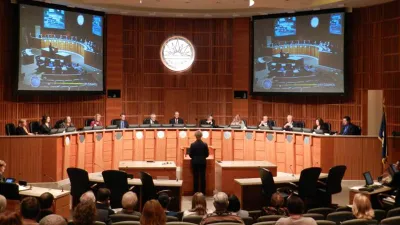Does giving short shrift to grassroots tradition cut against the dynamics of community-based decision-making?

Chuck Wolfe provides perspective on how Mercer Island, Washington—a small, leafy city between Seattle and Bellevue—recently reconstituted the city's Planning Commission in a way that arguably contradicts the dynamics of community-based decision-making, reducing local membership and substituting paid professionals who reside outside the city.
The change also raised concerns among some council members and residents about the implications of replacing residents with non-residents and paid practitioners to make community decisions. A petition, testimony, and letters in opposition stressed the unprecedented approach in the Puget Sound region.
In addition, Wolfe notes that planning commissions have a storied place in American history. Their hallmark was their grassroots composition—an early form of co-creation, a bridge between government and citizenry.
He outlined three concerns:
Will the involvement of non-resident practitioners lead to decisions that do not represent the community?
Will the council’s action weaken residents’ sense of ownership and civic responsibility for community planning?
Similarly, will the commission become disconnected from the local community and its contextual needs, compromising effectiveness and inclusivity?
He concludes that the city must remain mindful of retaining long-term resident wisdom and maximizing civic engagement:
While these forms of participation are often mandated by state law and local code, they need to be more than lip service and more like co-creation.
FULL STORY: Why 'Hack' a Planning Commission?

National Parks Layoffs Will Cause Communities to Lose Billions
Thousands of essential park workers were laid off this week, just before the busy spring break season.

Retro-silient?: America’s First “Eco-burb,” The Woodlands Turns 50
A master-planned community north of Houston offers lessons on green infrastructure and resilient design, but falls short of its founder’s lofty affordability and walkability goals.

Delivering for America Plan Will Downgrade Mail Service in at Least 49.5 Percent of Zip Codes
Republican and Democrat lawmakers criticize the plan for its disproportionate negative impact on rural communities.

Test News Post 1
This is a summary

Test News Headline 46
Test for the image on the front page.

Balancing Bombs and Butterflies: How the National Guard Protects a Rare Species
The National Guard at Fort Indiantown Gap uses GIS technology and land management strategies to balance military training with conservation efforts, ensuring the survival of the rare eastern regal fritillary butterfly.
Urban Design for Planners 1: Software Tools
This six-course series explores essential urban design concepts using open source software and equips planners with the tools they need to participate fully in the urban design process.
Planning for Universal Design
Learn the tools for implementing Universal Design in planning regulations.
EMC Planning Group, Inc.
Planetizen
Planetizen
Mpact (formerly Rail~Volution)
Great Falls Development Authority, Inc.
HUDs Office of Policy Development and Research
NYU Wagner Graduate School of Public Service





























